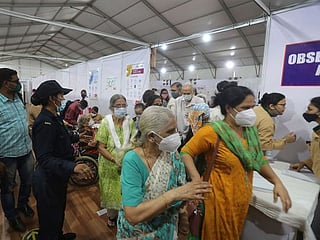West Bengal elections 2021: Who will be BJP’s chief ministerial candidate?
Modi-Shah recipe for ‘perfect storm’: ‘Stock’ and ‘shock’ option and all else in between

Even a cursory look at the concept of Game Theory makes it appear as something quite overwhelming. To put it in a layman’s terms, Game Theory is primarily a study or analysis of the ways in which the interacting choices that are available to economic agents produce end results with respect to the preferences of those agents, though the results in question may have been intended by none of the agents.
In the poll-bound Indian state of West Bengal, the issue of projecting a chief ministerial face within the Bharatiya Janata Party (BJP) fold is currently mired in such a complex web of smoke-and-mirrors, that decoding it is little short of trying to solve a macroeconomic paradigm by applying the principle of Game Theory!
To start with, in this complex game, what is being revealed is just a minuscule portion of what is actually being concealed. And quite like the principle of Game Theory, the ‘agents’ — or the dramatis personae, in this case — are inhabiting a political matrix, where the absolute end result may have been intended by none of these ‘agents’!
Fielding four sitting MPs
The central leadership of the BJP (which effectively means the Amit Shah-Narendra Modi power pack) has fielded every single BJP leader worth his or her name in the state as a candidate in the forthcoming assembly elections. In fact, the BJP’s list of candidates for the 294-seat West Bengal Legislative Assembly even includes four sitting members of parliament (MP) from the party — Babul Supriyo, Locket Chatterjee, Nishith Pramanik and Swapan Dasgupta.
Now, linear logic would say that by fielding so many of its sitting MPs in the assembly polls, BJP wants to send out a strong message that it doesn’t want to leave even a single stone unturned in its great churn for a suitable chief ministerial candidate from the state from among its ‘bhumi putras’ (sons of the soil).
This logic gains even more ground when we see that someone like Mukul Roy, one of the national vice-presidents of the BJP who has always been known for his guile and acumen as a back room strategist and a master poll manager, has also been named as a candidate this time around.
And that too not from the comfort zone of his pocket borough of Kanchrapara, Bhatpara, Naihati or Jagaddal in North 24 Parganas, but from the faraway seat of Krishnanagar North in Nadia district. Exactly after 20 years, Roy will be fighting an election.
Or take, for instance, the case of Rahul Sinha — a former president of the state unit of the party in Bengal. For the record, Sinha has so far lost nine assembly and parliamentary elections. And yet, he has been named as the BJP candidate from the Kolkata North seat.
All hands on the deck
So the message that the BJP is trying to put across in very obvious terms is that the party is dead serious about wresting Bengal from the Mamata Banerjee-led Trinamool Congress and is trying to ensure that it’s all-hands-on-the-deck to add credence to its war cry. Fair enough.
But here begins the fun.
The BJP central leadership has very conspicuously left out from the list of candidates the name of perhaps the most vocal, most firebrand and by far the most visible personality from among its leaders in Bengal. We are talking about Dilip Ghosh, president of the state unit of BJP in Bengal and sitting MP from Midnapore.
The ostensible reason cited by the party leadership and Ghosh himself is that it wouldn’t have been prudent to tie a heavyweight political figure like him to just one seat. He should be free to campaign all over the state.
The ‘stock’ option
However, in reality, Ghosh has probably been very carefully kept aside as BJP’s ‘stock’ option for a chief ministerial. This is like killing many birds with one stone. There are several post-poll scenarios that are likely to emerge within the BJP should the party get within sniffing distance of a majority. There will undoubtedly be multiple claimants to the CM’s post within the saffron brigade.
The ‘Game Theory-esque’ calculations likely worked out by the BJP mandarins (read Shah-Modi duo) is that if some of the heavyweight candidates end up losing, then they will be automatically eliminating themselves from the race. Now if there are multiple hopefuls for CM from amongst those who win and if the leadership issue takes an ugly turn post-poll, then Ghosh will be the BJP central leadership’s one-man ‘peacekeeping force’ to be deployed as a ‘consensus’ candidate for CM. The Bengal elections this time around are such a razor's-edge political tussle that not a single seat from amongst the 294 can really be termed as a 'safe' seat -- even Mamata's win from Nandigram is no longer a 'given', mind you. Keeping such a predicament in mind, the BJP central leadership probably thought it best not to risk fielding Ghosh as a candidate and face the ticklish eventuality of him ending up as a losing candidate.
Prime Minister and BJP stalwart Narendra Modi’s wholesome praise for Ghosh as an extremely committed party grafter, during his election rally in Kharagpur last Saturday, has added to Ghosh’s rising stature within the party fold as a first-among-equals.
Battleground Nandigram
Now along with Ghosh, the other personality who has added an interesting dimension to the BJP’s likely CM candidate jigsaw is Suvendu Adhikari — the former trusted political aide to Mamata, who quit TMC and joined BJP last December.
By fielding Adhikari against Mamata from the highly sensitive and most talked-about seat of Nandigram, BJP has once again seemingly applied the same module, whereby the ‘interacting choices that are available to the agents produce end results with respect to the preferences of those agents, though the results may have been intended by none of the agents’.
Again, remember Game Theory? If Adhikari beats Mamata and BJP manages to win a majority, then he will undoubtedly emerge as the strongest contender for CM and the dialectics of a leadership struggle within the BJP will be put to rest without much bloodshed.
Even in such a scenario, the counterweight of Ghosh can still be used as a bargaining chip by the BJP central leadership to get Adhikari to toe the party line and not emerge as an outright Frankenstein.
Mithun, the ‘X’ factor
And last but not the least, is the ‘X’ factor called Mithun Chakraborty.
Chakraborty, in a way, could be the BJP’s ‘shock’ option for CM in a post-poll scenario, whereby, even though the Bollywood star hasn't been fielded as a candidate, yet, given his popularity as a celebrity, he can always be projected as the other ‘consensus’ choice, after Ghosh, and may easily make it to the assembly through the by-election route within six months after government-formation.
With Chakraborty’s name confirmed on the electoral rolls as a voter from the Cossipore-Belgachhia area in North Kolkata last Sunday, BJP may have a few surprises in store so far as the actor-turned-politician is concerned.
In a nutshell, this could well be the BJP’s recipe for a ‘perfect storm’ in pursuit of power in a ‘last frontier’ state of sorts.
Game on — with or without the ‘Theory’ bit, it seems.
Twitter: @moumiayush
Sign up for the Daily Briefing
Get the latest news and updates straight to your inbox








